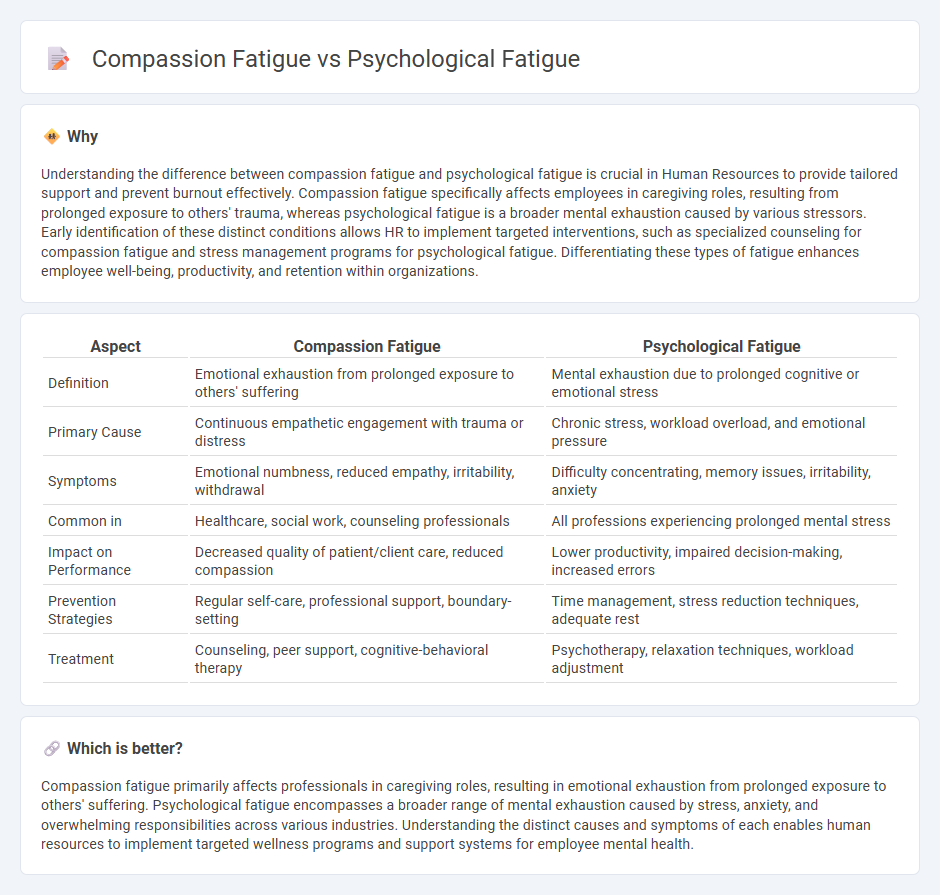
Compassion fatigue and psychological fatigue are critical concerns in human resources, impacting employee well-being and productivity. Compassion fatigue arises from prolonged exposure to others' suffering, leading to emotional exhaustion and reduced empathy, while psychological fatigue stems from chronic stress and cognitive overload, causing mental weariness and decreased motivation. Explore effective strategies to recognize and manage both conditions for a healthier workplace environment.
Why it is important
Understanding the difference between compassion fatigue and psychological fatigue is crucial in Human Resources to provide tailored support and prevent burnout effectively. Compassion fatigue specifically affects employees in caregiving roles, resulting from prolonged exposure to others' trauma, whereas psychological fatigue is a broader mental exhaustion caused by various stressors. Early identification of these distinct conditions allows HR to implement targeted interventions, such as specialized counseling for compassion fatigue and stress management programs for psychological fatigue. Differentiating these types of fatigue enhances employee well-being, productivity, and retention within organizations.
Comparison Table
| Aspect | Compassion Fatigue | Psychological Fatigue |
|---|---|---|
| Definition | Emotional exhaustion from prolonged exposure to others' suffering | Mental exhaustion due to prolonged cognitive or emotional stress |
| Primary Cause | Continuous empathetic engagement with trauma or distress | Chronic stress, workload overload, and emotional pressure |
| Symptoms | Emotional numbness, reduced empathy, irritability, withdrawal | Difficulty concentrating, memory issues, irritability, anxiety |
| Common in | Healthcare, social work, counseling professionals | All professions experiencing prolonged mental stress |
| Impact on Performance | Decreased quality of patient/client care, reduced compassion | Lower productivity, impaired decision-making, increased errors |
| Prevention Strategies | Regular self-care, professional support, boundary-setting | Time management, stress reduction techniques, adequate rest |
| Treatment | Counseling, peer support, cognitive-behavioral therapy | Psychotherapy, relaxation techniques, workload adjustment |
Which is better?
Compassion fatigue primarily affects professionals in caregiving roles, resulting in emotional exhaustion from prolonged exposure to others' suffering. Psychological fatigue encompasses a broader range of mental exhaustion caused by stress, anxiety, and overwhelming responsibilities across various industries. Understanding the distinct causes and symptoms of each enables human resources to implement targeted wellness programs and support systems for employee mental health.
Connection
Compassion fatigue and psychological fatigue are interconnected through their shared impact on emotional and mental exhaustion experienced by professionals in caregiving roles. Continuous exposure to stressful situations and the emotional demands of supporting others can deplete an individual's psychological resilience, leading to both conditions simultaneously. Addressing workplace stressors and implementing effective coping strategies are essential to mitigate the negative effects on human resources and maintain workforce well-being.
Key Terms
Burnout
Psychological fatigue refers to a general state of mental exhaustion caused by prolonged stress or intense cognitive activity, while compassion fatigue is a specific type of burnout experienced by caregivers and healthcare professionals due to continuous exposure to others' suffering. Burnout encompasses emotional exhaustion, depersonalization, and reduced personal accomplishment, often overlapping with compassion fatigue but broader in scope. Explore more to understand how these conditions impact mental health and effective coping strategies.
Emotional exhaustion
Psychological fatigue involves a general state of mental and emotional depletion resulting from prolonged stress or cognitive overload, while compassion fatigue specifically arises from continuous exposure to others' suffering, leading to emotional exhaustion unique to caregiving professions. Emotional exhaustion in psychological fatigue manifests as a reduced capacity to manage everyday tasks, whereas in compassion fatigue, it is closely tied to feelings of helplessness and decreased empathy toward those suffering. Explore more to understand effective strategies for managing these distinct forms of emotional exhaustion.
Empathy depletion
Psychological fatigue manifests as a general state of mental exhaustion, while compassion fatigue specifically arises from prolonged exposure to others' suffering, leading to empathy depletion and emotional numbness. Empathy depletion in compassion fatigue reduces one's ability to connect and respond effectively to others' distress, impacting both personal wellbeing and professional caregiving roles. Explore further insights on managing empathy depletion and fostering resilience in caregiving professions.
Source and External Links
Tired All the Time: Fatigue and Mental Health | Newport Institute - Mental health challenges like depression, anxiety, and stress can cause persistent fatigue, affecting both emotional regulation and physical well-being, often leading to symptoms such as irritability, insomnia, and difficulty concentrating.
Mental Exhaustion Symptoms, Causes, and Ways to Cope - BetterUp - Psychological fatigue, often called mental exhaustion, is characterized by extreme tiredness, apathy, cynicism, and irritability, typically resulting from prolonged stress, lack of motivation, and difficulty focusing on daily tasks.
Mentally exhausted? Here's 10 ways to overcome mental fatigue - Mental fatigue can leave you feeling drained, easily irritable, and unmotivated, with both emotional symptoms (like anxiety and lack of concentration) and physical symptoms (such as sleep issues, headaches, and appetite changes).
 dowidth.com
dowidth.com